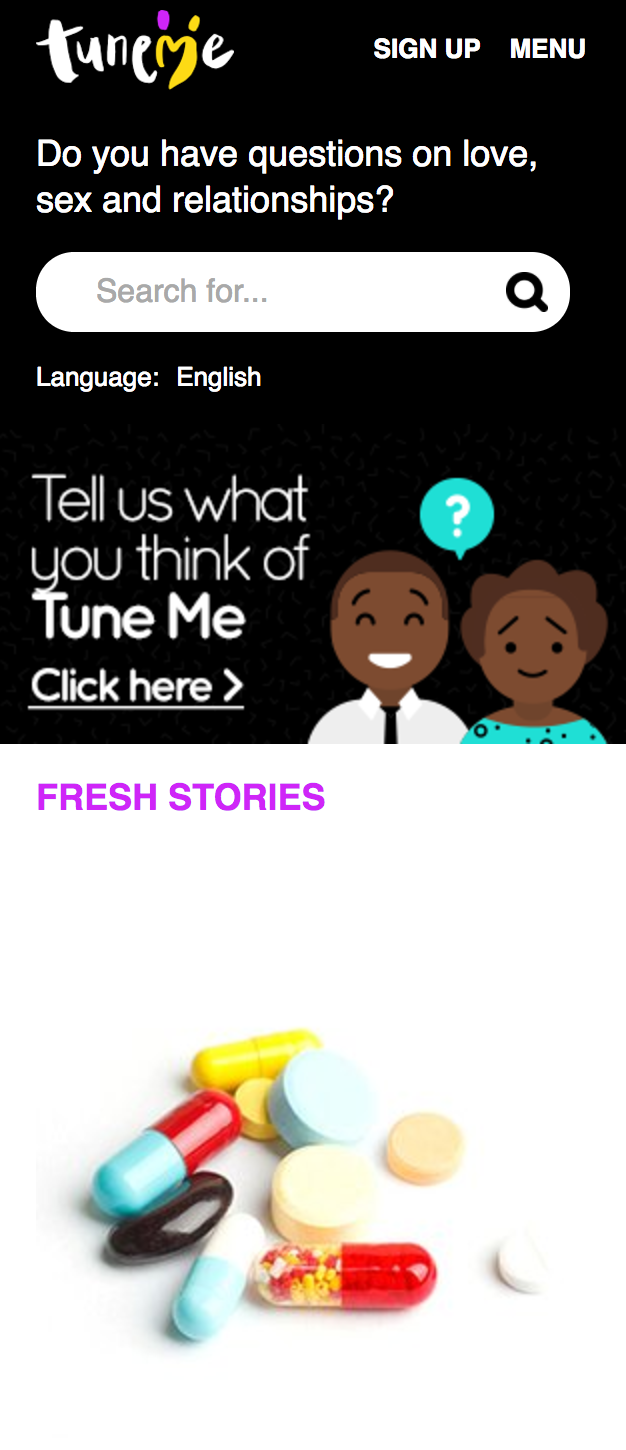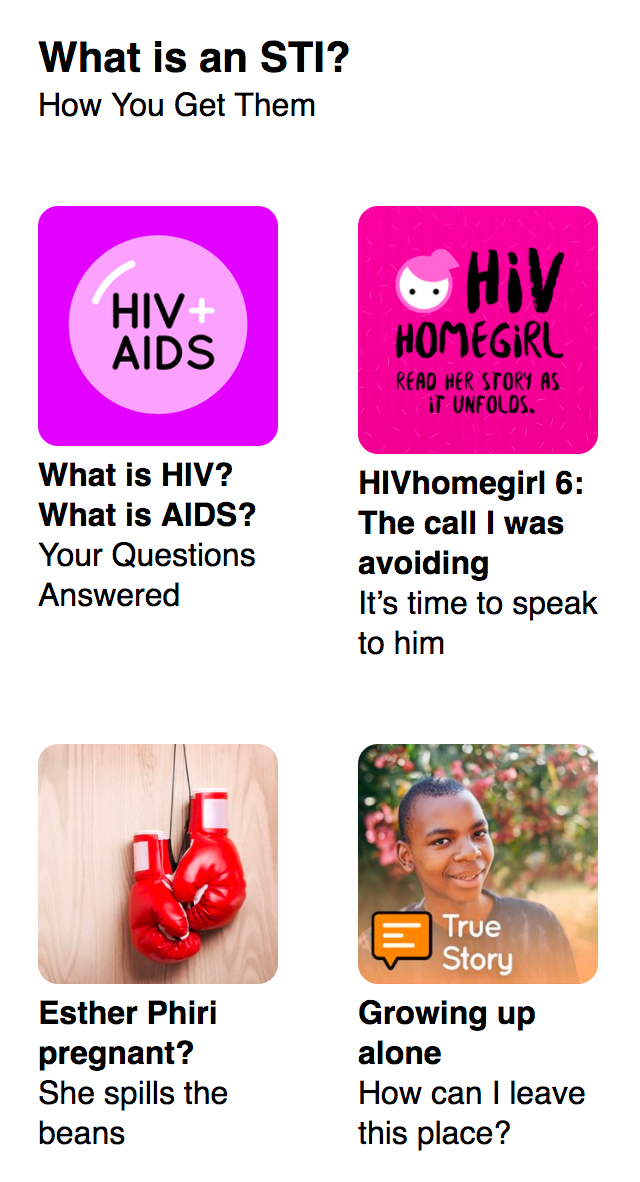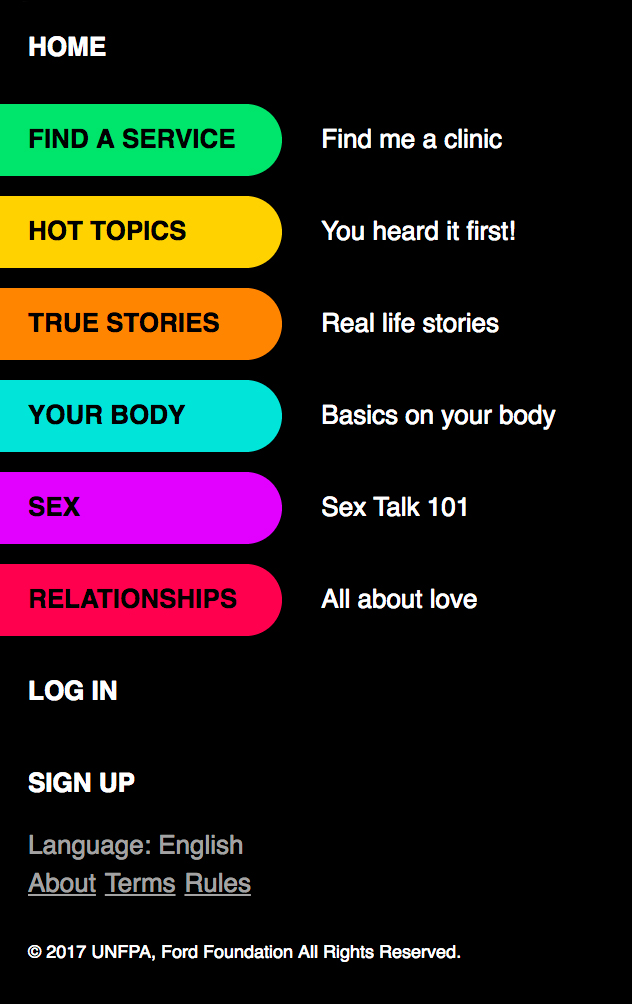3 Things We’ve Learned in Creating Youth SRHR Digital Content
Jessica Manim, part of Praekelt.org’s content team, manages the sites and in- country teams for Tune Me. Tune Me is a sexual and reproductive health and rights mobile optimized website funded by Ford Foundation and UNFPA aimed at improving the lives of youths in Sub-Saharan Africa by empowering them to make informed decisions around their bodies. Currently live in Zambia, Zimbabwe and Malawi, we will launch in an additional 4 countries by the end of 2017. Jessica describes below her key learnings so far.
From dealing with a crush to sorting out a rash down there, Tune Me is all about love, sex, relationships — and health.
I’ve worked in the editorial sphere for pop culture, teen and women’s interest magazines and websites, so stepping into the world of SRHR is a paradigm shift of note. What excited me about coming on board at Praekelt was the opportunity to do work that meant something; work that has a real impact on the lives of our users.
TuneMe addresses both girls and guys across a range of ages and socio-economic groups — and all within the same content set. Crafting content and social media that covers all of these aspects, all within the 250 word limit of feature phone screens, requires dynamic messaging. While every project starts out with a plan for how the content should work and who should engage with it, once a site becomes a living, breathing thing — that can all change.
1. It’s Crucial to Create Content that Reaches Men and Women
Previously when working with SRHR content in teen media, I’d tackled it purely from a teen girl perspective. An interesting trend we’ve picked up from our Tune Me Facebook user group as well as the users commenting on articles, is that our user base seems to be primarily male (our community on Facebook is 55% male). While we can’t know for certain why this is, as a team, we feel that this is likely because young men in these regions are more likely to be the owners of cellphones.
Working on Tune Me provided a challenge to look at how to communicate to young men as well as young women (sometimes even in the same article). To date, the articles we see getting the most page-views are articles about sex (such as Are You Ready For Sex?) and relationship advice (such as How to Tell if He/She Likes You). Creating articles where one gender gets to understand more of how the other gender thinks has been key to successful engagement.
While challenging to develop content for both boys and girls, Tune Me presents a real opportunity to speak about SRHR to guys. Often, the burden of sexual health falls to young women, but in many of our territories, it’s the girls who are often the victims of love, sex and relationships gone wrong. Involving boys in the conversations is crucial for real change in this area.


2. Your Community Will Live Where It Wants To
Tune Me is built on the concepts and successes of Praekelt’s former youth engagement platforms, namely YoungAfricaLive, a large scale SRH&R mobisite that engaged youth in South Africa for several years. At the time YAL was active, Facebook penetration was not high in our target youth communities. Now, we’re seeing Tune Me’s strong community develop and grow on the Zambian site's Facebook site.
We had initially only leveraged Facebook as a marketing tool to push users to the mobisite, envisioning the mobisite to be where the community lived. But, the community’s involvement and high level of engagement on Facebook has meant that we need to rethink and relook at Facebook’s role in the TuneMe ecosystem.
HIV Homegirl is a series of chapters recounting how a young woman finds out about her status, goes into denial, then acceptance, then embraces a new life, living positively with HIV. Stitching the stories together in sequence on mobi and FB ended up working well. The role of social media in the lives of the user (and its place in a site’s ecosystem) should never be underestimated
3. Social Context is Everything
I’m from South Africa. Working on content for a site based in another country brings in a number of challenges around context and culture. A piece of content that we might find inoffensive or mild (particularly when covering issues of sex or sexual health) in South Africa may be highly controversial in another territory. For example, a topic such as masturbation isn’t hugely controversial when referenced or discussed in a public setting in South Africa (think of all the top glossy women’s mags in your supermarket!) But in other countries, talking about it publicly can be seen as totally inappropriate. Strong cultural and religious beliefs can dictate what users feel is and isn’t appropriate to discuss in public forums such as a mobisite or Facebook.
While content needs to retain essential messaging in order to have impact — for example, around the safe use of condoms — it also needs to be contextually appropriate. Content that offends, won’t be consumed or shared. And in the arena of sexual health, many things can offend; most especially where cultural or religious norms are being questioned.
As we begin to expand Tune Me into new territories, I am sure we will face further challenges around specific regional contexts and sensitivities, youth media patterns, and gender norms. But I believe strongly in this project’s aims to empower the youth of every country to make fully informed decisions about their bodies, sexual health and relationships. And I believe that this project can and will have an impact.

All photos via Praekelt Foundation


